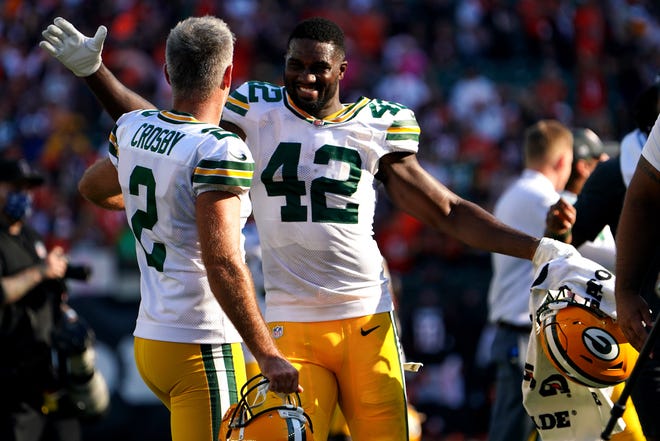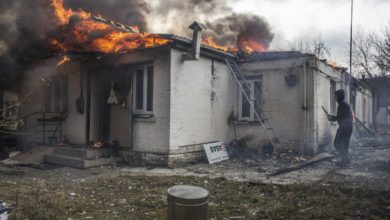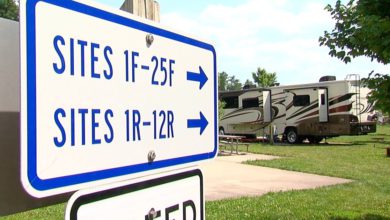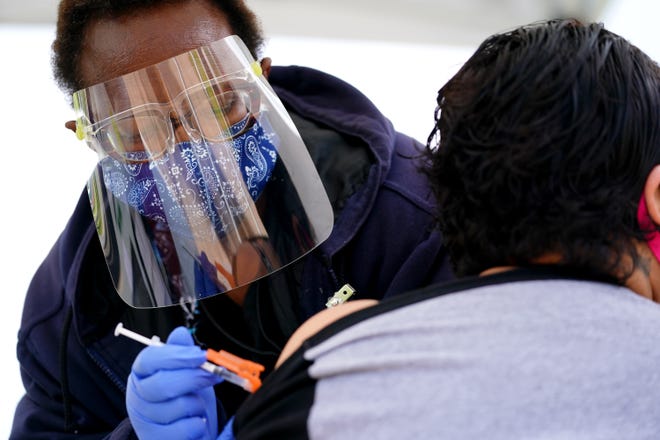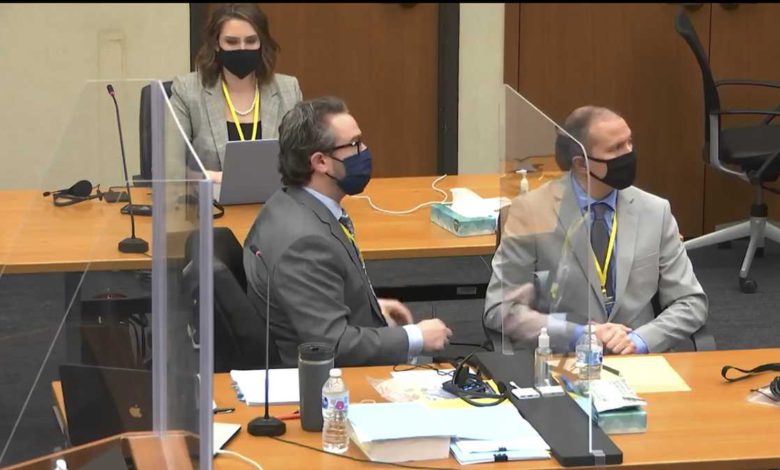
Video above: Hundreds rally near trial in George Floyd's deathBecause the trial of a former Minneapolis police officer charged in George Floyd's death is being held during the coronavirus pandemic, the courtroom has been overhauled for safety.Gone are the traditional jury box and gallery, replaced with widely spaced seats and desks for a limited contingent of attorneys, jurors and media. Plexiglas barriers and hand sanitizer are everywhere, and the participants – even the judge – wear masks.The pandemic has upended court systems across the country, delaying jury trials and creating huge backlogs of cases. Video and teleconference hearings have allowed judges to keep the wheels of justice grinding, albeit slowly. Many courts have installed barriers or moved jury orientation and even trials themselves to bigger spaces such as convention centers to get at least some jury trials going again.In Minnesota, in-person criminal jury trials have been mostly on hold since November. Chief Justice Lorie Gildea last month allowed them to resume effective March 15, with proper safety protocols consistent with guidance from the Centers for Disease Control and Prevention and the Minnesota Department of Health. Most other proceedings will continue to be held remotely through April 30. A handful of exceptions have been allowed, including for the trial of Derek Chauvin's trial, the former Minneapolis officer charged in Floyd's death."We are gradually increasing in-person activities in court facilities in a safe and responsible manner that will allow the courts to fulfill our constitutional obligation, while we continue to do all that we can to protect public health and safety," Gildea said in a statement.Chauvin is charged with second-degree murder and manslaughter. Floyd was declared dead May 25 after Chauvin, who is white, pressed his knee against the Black man's neck for about nine minutes, holding his position even after Floyd went limp. Floyd's death sparked sometimes violent protests in Minneapolis and beyond, leading to a nationwide reckoning on race and one of the highest-profile trials of a police officer in U.S. history. Citing the need to comply with social distancing and other safety rules, Hennepin County District Judge Peter Cahill separated Chauvin's case from that of the three other ex-officers charged in Floyd's death, who are set for trial in August. Among other things, Cahill concluded in January, no courtroom in the building was big enough to safely accommodate four defense teams and the prosecution team all at once.Prosecutors tried unsuccessfully to persuade Cahill to reconsider his decision to hold two trials. They argued instead for holding a single joint trial sometime this summer when they hoped enough Minnesotans would have been vaccinated to reduce the risk of any participants getting COVID-19. They submitted an affidavit from prominent University of Minnesota epidemiologist Michael Osterholm, who warned that it could be "extremely dangerous" to try Chauvin this month, with "potentially catastrophic consequences for public health." He expressed fear that it could become a "superspreader event," given the large number of protesters and out-of-town journalists it was likely to draw, especially if more-contagious coronavirus variants cause a spike in cases. But Cahill provided little explanation for rejecting those arguments, having already ruled that the proceedings would comply with court safety rules, and he kept the case on course for the trial's opening on Monday.The 18th-floor courtroom Cahill borrowed is the largest in the Hennepin County Government Center, and it has been overhauled for the purposes of Chauvin's trial. The seating capacity was sharply reduced in the remodeling. The theater-style seating in what was the gallery was removed to create space. Tall plexiglass dividers separate the judge and court staffers from the limited number of other people in the courtroom. Clear plastic sheets also run down the middle of the defense and prosecution tables. When Chauvin and defense attorney Eric Nelson want to confer, they need to lean back a bit.The normal jury box has been replaced with two rows of office chairs, spaced out, with small desks. There is no space for the general public. Seats are reserved in the back for just one Floyd family member and just one Chauvin family member. Only two pool reporters are allowed in at a time, plus a member of the Court TV team that's providing the feed.The constitutional requirement for a public trial is being satisfied by allowing gavel-to-gavel TV coverage, which is rare in Minnesota courts. Cahill has taken pains to keep the identities of the potential jurors secret, prohibiting them from being shown on camera. But he got a surprise Tuesday when a retired judge watching from home texted him to let him know that he could see a reflection of Juror No. 1 in one of the plexiglass panels. The problem was quickly fixed.Everyone in the courtroom is required to wear a face mask. The main exceptions are when attorneys speak at the podium, which has plastic panes on three sides, and when potential jurors respond to questions.When the judge and the attorneys need to conduct a sidebar discussion, they don't huddle around the judge's bench like they normally would. Instead they put on headsets so they can hash out legal or procedural issues out of earshot of jurors.Only four prosecutors and two defense attorneys are in court at any given time; the rest of their teams must participate remotely. So must the defense teams for the three other ex-officers facing trial this summer.
Video above: Hundreds rally near trial in George Floyd's death
Because the trial of a former Minneapolis police officer charged in George Floyd's death is being held during the coronavirus pandemic, the courtroom has been overhauled for safety.
Gone are the traditional jury box and gallery, replaced with widely spaced seats and desks for a limited contingent of attorneys, jurors and media. Plexiglas barriers and hand sanitizer are everywhere, and the participants – even the judge – wear masks.
The pandemic has upended court systems across the country, delaying jury trials and creating huge backlogs of cases. Video and teleconference hearings have allowed judges to keep the wheels of justice grinding, albeit slowly. Many courts have installed barriers or moved jury orientation and even trials themselves to bigger spaces such as convention centers to get at least some jury trials going again.
In Minnesota, in-person criminal jury trials have been mostly on hold since November. Chief Justice Lorie Gildea last month allowed them to resume effective March 15, with proper safety protocols consistent with guidance from the Centers for Disease Control and Prevention and the Minnesota Department of Health. Most other proceedings will continue to be held remotely through April 30. A handful of exceptions have been allowed, including for the trial of Derek Chauvin's trial, the former Minneapolis officer charged in Floyd's death.
"We are gradually increasing in-person activities in court facilities in a safe and responsible manner that will allow the courts to fulfill our constitutional obligation, while we continue to do all that we can to protect public health and safety," Gildea said in a statement.
Chauvin is charged with second-degree murder and manslaughter. Floyd was declared dead May 25 after Chauvin, who is white, pressed his knee against the Black man's neck for about nine minutes, holding his position even after Floyd went limp. Floyd's death sparked sometimes violent protests in Minneapolis and beyond, leading to a nationwide reckoning on race and one of the highest-profile trials of a police officer in U.S. history.
Citing the need to comply with social distancing and other safety rules, Hennepin County District Judge Peter Cahill separated Chauvin's case from that of the three other ex-officers charged in Floyd's death, who are set for trial in August. Among other things, Cahill concluded in January, no courtroom in the building was big enough to safely accommodate four defense teams and the prosecution team all at once.
Prosecutors tried unsuccessfully to persuade Cahill to reconsider his decision to hold two trials. They argued instead for holding a single joint trial sometime this summer when they hoped enough Minnesotans would have been vaccinated to reduce the risk of any participants getting COVID-19.
They submitted an affidavit from prominent University of Minnesota epidemiologist Michael Osterholm, who warned that it could be "extremely dangerous" to try Chauvin this month, with "potentially catastrophic consequences for public health." He expressed fear that it could become a "superspreader event," given the large number of protesters and out-of-town journalists it was likely to draw, especially if more-contagious coronavirus variants cause a spike in cases.
But Cahill provided little explanation for rejecting those arguments, having already ruled that the proceedings would comply with court safety rules, and he kept the case on course for the trial's opening on Monday.
The 18th-floor courtroom Cahill borrowed is the largest in the Hennepin County Government Center, and it has been overhauled for the purposes of Chauvin's trial. The seating capacity was sharply reduced in the remodeling. The theater-style seating in what was the gallery was removed to create space. Tall plexiglass dividers separate the judge and court staffers from the limited number of other people in the courtroom. Clear plastic sheets also run down the middle of the defense and prosecution tables. When Chauvin and defense attorney Eric Nelson want to confer, they need to lean back a bit.
The normal jury box has been replaced with two rows of office chairs, spaced out, with small desks. There is no space for the general public. Seats are reserved in the back for just one Floyd family member and just one Chauvin family member. Only two pool reporters are allowed in at a time, plus a member of the Court TV team that's providing the feed.
The constitutional requirement for a public trial is being satisfied by allowing gavel-to-gavel TV coverage, which is rare in Minnesota courts. Cahill has taken pains to keep the identities of the potential jurors secret, prohibiting them from being shown on camera. But he got a surprise Tuesday when a retired judge watching from home texted him to let him know that he could see a reflection of Juror No. 1 in one of the plexiglass panels. The problem was quickly fixed.
Everyone in the courtroom is required to wear a face mask. The main exceptions are when attorneys speak at the podium, which has plastic panes on three sides, and when potential jurors respond to questions.
When the judge and the attorneys need to conduct a sidebar discussion, they don't huddle around the judge's bench like they normally would. Instead they put on headsets so they can hash out legal or procedural issues out of earshot of jurors.
Only four prosecutors and two defense attorneys are in court at any given time; the rest of their teams must participate remotely. So must the defense teams for the three other ex-officers facing trial this summer.
Source link




